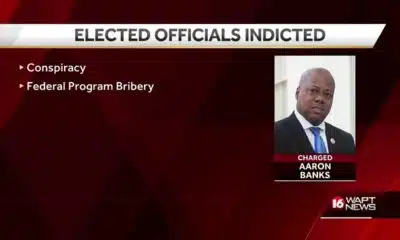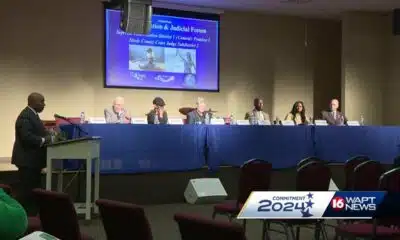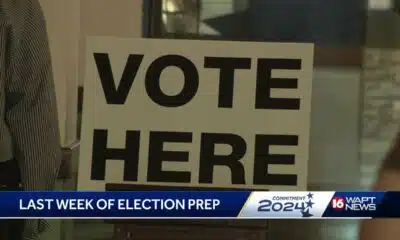Mississippi News
Teachers: 17% left their district in 2020-21 school year
‘It was an easy choice for me’: 17% of teachers left their district in the 2020-21 school year
Jasmine Cleark-Gibson left teaching last month after seven and a half years in the classroom. It was time for a change. The lack of autonomy in her job made her feel like “she couldn’t fix things anymore,” and the myriad of responsibilities placed on her as an educator also left her with no bandwidth to care for her own children.
“I found myself with nothing left to give to the people who are supposed to matter the most to me,” Cleark-Gibson said. “I was looking for a work-life balance that all people are trying to grasp, but nobody is respecting teachers enough to give them.”
Mississippi has suffered from a critical teacher shortage for years, one that has only recently been measured. The Department of Education announced in December 2021 that there were over 3,000 certified teacher vacancies, a staggering figure considering that there are about 32,000 teachers across the state.
Teachers and policymakers have long emphasized the need for competitive salaries to attract more teachers to Mississippi, a goal that saw progress this year when the Legislature passed the largest teacher pay raise in Mississippi history, putting Mississippi teachers above the Southeastern average.
Despite these improvements, teachers in Mississippi are still leaving the classroom to teach in other states or take jobs in other fields. Data from the Mississippi Department of Education shows 5,800 teachers left their district at the end of the 2020-21 school year, or 17% of all teachers. These teachers may have moved between districts or left the profession entirely — this distinction is not captured in the MDE data.
Cleark-Gibson found her way to teaching through an alternate route program at Mississippi Valley State University, and taught English in the Leflore County School District, Midtown Public Charter School, and the Hinds County School District.
She said she loved helping students reach the “lightbulb moment” and building relationships with students, since “they don’t care about the content until they know you care about them.”
But the pressures that are put on teachers — like countless meetings that take time away from lesson planning and the responsibility to be in tune with each student’s social and emotional well-being — left Cleark-Gibson overwhelmed.
For Chevonne Dixon, a fifteen-year veteran of the Mississippi public education system, the time constraints were still a real concern, but the biggest factor was money. Dixon is a resident of DeSoto county but drives across the border to teach in Memphis, where she makes more and gets paid twice a month.
“During the pandemic, I started filling out applications and I saw that I could actually live off of what I would be making in Memphis … so it was an easy choice for me,” she said.
Dixon also highlighted the pressure that student loans put on teachers to seek higher-paying opportunities, something that Mississippi First K-12 Policy Director Toren Ballard has also been researching. Mississippi First published a report in January that found over half of Mississippi teachers were considering leaving the classroom within the next year.
They surveyed 6,500 Mississippi teachers, data Ballard has continued digging into and has noticed some stark disparities. Teachers with student debt are twice as likely to be SNAP recipients and over twice as likely to not have $400 in case of an emergency.
But that student debt also isn’t distributed evenly across the state. Ballard found that one in four teachers in F-rated districts owe over $100,000 in student debt, while only 4-5% of teachers in A and B-rated districts do. Poorly rated districts are also more likely to have teachers not return year-over-year, according to the data from MDE.
“Teaching in Mississippi, obviously everyone’s salaries are low, but it’s a very inequitable profession even given that,” Ballard said. “People are experiencing wildly different financial realities.”
The Mississippi First report found that over 90% of teachers thinking about leaving the classroom cited salaries as their reason, but respect from administrators came close behind. Amelia Watson, who taught for two and half years in the Petal and Pearl Public School Districts, said she was stretching herself thin to be the teacher she, and school leaders, wanted her to be.
“I was meeting the expectations of my administrators, but it was nearly impossible to do so during contract hours,” Watson said. “I wasn’t willing anymore to sacrifice my free time and my mental well-being, unpaid, for a job that doesn’t celebrate our achievements.”
Watson said her husband and co-workers noticed her mental health declining during her third year, which led to her resignation. She has considered going back, but has found a great deal of stability in the boundaries of her current job as a recruitment coordinator, and said she wasn’t sure teaching would ever be able to give that to her.
As for Dixon, the teacher in Memphis, she’s not planning to leave the profession any time soon. When asked if the most recent pay raise made Dixon reconsider taking a job out of state, she said no. She said that the salaries still aren’t where they should be, and that getting paid once a month necessitates being a strong budgeter — but if Mississippi were to fix those things, she would return.
“My (plan) was to teach and retire in Mississippi, but I can’t afford to,” she said.
This article first appeared on Mississippi Today and is republished here under a Creative Commons license.
Mississippi News
Suspect in Charlie Kirk killing is charged with murder as prosecutor says DNA found on rifle trigger
SUMMARY: Tyler Robinson, 22, was charged with the murder of conservative figure Charlie Kirk, shot Sept. 10 at Utah Valley University. Robinson confessed via text to his partner and left a note expressing intent to kill Kirk, citing hatred. DNA linked Robinson to the rifle used. Prosecutors revealed Robinson planned the attack for over a week and targeted Kirk, a key conservative youth leader. Robinson’s political views shifted after dating a transgender man, causing family tensions. After the shooting, Robinson discarded evidence and urged his partner to delete texts. FBI investigates possible wider connections. Charges include murder with potential death penalty enhancements.
Read the full article
The post Suspect in Charlie Kirk killing is charged with murder as prosecutor says DNA found on rifle trigger appeared first on www.wjtv.com
Mississippi News
Suspect in Charlie Kirk assassination believed to have acted alone, says Utah governor
SUMMARY: Tyler Robinson, 22, was arrested for the targeted assassination of conservative activist Charlie Kirk in Orem, Utah. Authorities said Robinson had expressed opposition to Kirk’s views and indicated responsibility after the shooting. The attack occurred during a Turning Point USA event at Utah Valley University, where Kirk was shot once from a rooftop and later died in hospital. Engravings on bullets and chat messages helped link Robinson to the crime, which was captured on grim video. The killing sparked bipartisan condemnation amid rising political violence. President Trump announced Robinson’s arrest and plans to award Kirk the Presidential Medal of Freedom.
The post Suspect in Charlie Kirk assassination believed to have acted alone, says Utah governor appeared first on www.wjtv.com
Mississippi News
Americans mark the 24th anniversary of the 9/11 attacks with emotional ceremonies
SUMMARY: On the 24th anniversary of the 9/11 attacks, solemn ceremonies were held in New York, at the Pentagon, and in Shanksville to honor nearly 3,000 victims. Families shared personal remembrances, emphasizing ongoing grief and the importance of remembrance. Vice President JD Vance postponed his attendance to visit a recently assassinated activist’s family, adding tension to the day. President Trump spoke at the Pentagon, pledging never to forget and awarding the Presidential Medal of Freedom posthumously. The attacks’ global impact reshaped U.S. policy, leading to wars and extensive health care costs for victims. Efforts continue to finalize legal proceedings against the alleged plot mastermind.
The post Americans mark the 24th anniversary of the 9/11 attacks with emotional ceremonies appeared first on www.wcbi.com
-
News from the South - Kentucky News Feed7 days ago
Lexington man accused of carjacking, firing gun during police chase faces federal firearm charge
-
News from the South - Alabama News Feed7 days ago
Zaxby's Player of the Week: Dylan Jackson, Vigor WR
-
News from the South - Arkansas News Feed7 days ago
Arkansas medical marijuana sales on pace for record year
-
News from the South - North Carolina News Feed5 days ago
What we know about Charlie Kirk shooting suspect, how he was caught
-
Local News7 days ago
US stocks inch to more records as inflation slows and Oracle soars
-
Local News6 days ago
Russian drone incursion in Poland prompts NATO leaders to take stock of bigger threats
-
Local News Video6 days ago
Introducing our WXXV Student Athlete of the Week, St. Patrick’s Parker Talley!
-
News from the South - North Carolina News Feed5 days ago
Federal hate crime charge sought in Charlotte stabbing | North Carolina


















































